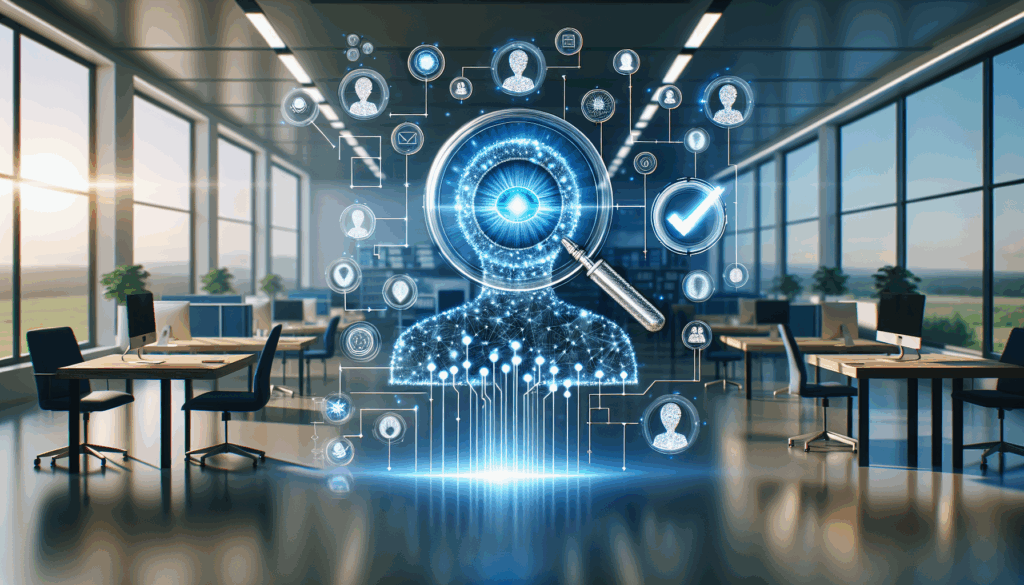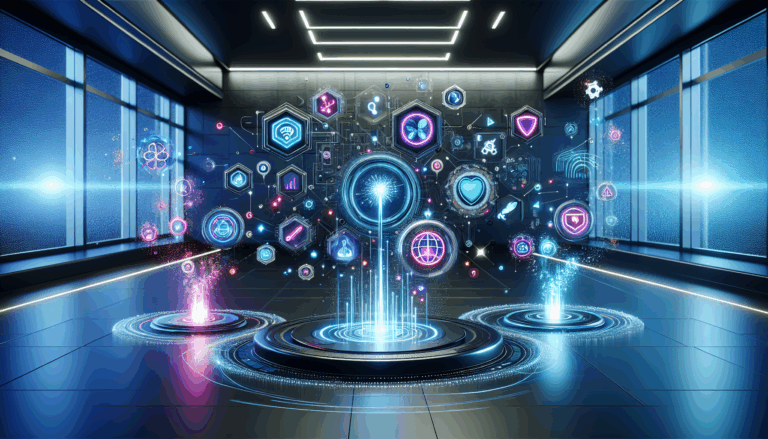What is Agentic AI? A Simple Overview
Agentic AI is a new class of artificial intelligence that doesn’t just react to commands or analyze data—it acts on its own to achieve specific goals. Unlike traditional AI, which follows programmed rules or responds to single queries, agentic AI is designed to take initiative and pursue objectives much like a human agent. This means it can plan, make decisions, learn from outcomes, adjust its approach, and even interact with the world autonomously.
To understand what makes agentic AI so revolutionary, it’s helpful to think of it as having its own “agency”—the capacity to choose actions in pursuit of a goal. As described by MIT Technology Review, agentic AI systems are constantly evaluating their environment, updating their strategies, and pushing toward an objective set by their designers or users.
Key characteristics of agentic AI include:
- Goal-driven behavior: The system is given an end goal and works actively to achieve it, thinking several steps ahead rather than just reacting.
- Autonomy: Agentic AI can carry out actions on its own, without waiting for user inputs at every step.
- Adaptive problem-solving: When faced with obstacles, agentic AI can change its strategy, learn from what works or doesn’t, and continue pursuing the outcome.
- Continuous learning: The AI refines its approach over time, improving its effectiveness and efficiency, often using techniques such as reinforcement learning (Coursera).
- Interaction with environments: Agentic AI can observe, decide, and act within real-world or digital environments, making it dynamic and context-aware.
Agentic AI is especially important as AI technology evolves toward more sophisticated, autonomous systems. For a technical deep dive, articles by Stanford AI Lab provide expert perspectives on how these systems are structured and why agency matters.
As AI continues to advance, the distinction between reactive systems and agentic ones will define how organizations harness automation, from streamlining internal operations to transforming entire industries.
Key Differences Between Agentic and Traditional AI
Understanding how agentic AI differs from traditional AI is crucial to appreciate its transformative potential in HR recruitment and beyond. While both categories of artificial intelligence are powerful, their underlying philosophies, modes of operation, and levels of autonomy set them apart in remarkable ways.
1. Autonomy and Decision-Making
Traditional AI systems operate on fixed rules or learn from historical data, making suggestions or predictions that still require human oversight. For instance, traditional AI may analyze resumes to recommend suitable candidates but always awaits human approval before moving candidates to the next stage.
Agentic AI, on the other hand, functions more like a smart collaborator or agent entrusted with several tasks. It can independently set sub-goals within recruitment—for example, not only shortlisting applicants based on specific criteria but also automatically scheduling interviews, sending personalized follow-up emails, and even providing real-time answers to candidate queries. This autonomy dramatically reduces manual intervention, making hiring processes faster and more efficient. For more on this distinction, see Stanford HAI’s perspective on agentic AI.
2. Adaptability and Dynamic Learning
Traditional AI algorithms excel when the environment is stable and well-defined. They use pre-learned patterns to make predictions but struggle to handle unfamiliar or changing scenarios. For example, if a new job role emerges or company requirements shift, a traditional AI recruiting tool might require retraining or manual rule updates to remain effective.
Agentic AI, powered by advanced models like those discussed by MIT Technology Review, is capable of actively sensing and responding to changing environments. For example, if candidate response rates drop, an agentic AI might proactively tweak outreach strategies, rewrite messaging, or prioritize candidates differently. This responsiveness allows agentic systems to keep recruitment outcomes optimized continuously, minimizing the lag between changing needs and effective execution.
3. Goal-Oriented Task Management
Traditional AI tools are typically reactive: they process inputs and produce outputs within a tightly defined scope. In recruitment, this might look like filtering out unsuitable resumes based on fixed keywords or qualifications.
Agentic AI operates with a broader, more proactive orientation. It not only processes tasks as they come but also plans and executes multiple steps in pursuit of a larger, predefined objective—such as building a diverse talent pipeline or improving candidate experience ratings. For example, an agentic AI could monitor diversity metrics and autonomously modify sourcing channels or outreach content to bring in underrepresented groups, anticipating both immediate and long-term goals. This is akin to having a digital recruiting assistant who understands strategic HR objectives and acts on them. Further reading on agentic planning in AI can be found at the Google AI Hub.
4. Accountability and Human-AI Collaboration
Traditional AI is inherently more straightforward to audit, as outputs can be traced directly to input data and code logic. However, this simplicity often restricts its capacity for innovation and decision support. Agentic AI introduces new layers of complexity—decisions can span multiple subtasks and stages, some of which may be initiated and completed without human involvement.
This shift creates both opportunities and challenges for HR teams: on one hand, agentic AI can handle repetitive workload autonomously; on the other, organizations must carefully design oversight and ethical guidelines to ensure fairness and accountability in hiring. The development of responsible agentic AI is an ongoing area of research, as outlined by the Stanford Center for AI Ethics, emphasizing transparency and bias mitigation strategies.
In summary, the paradigm shift from traditional to agentic AI in HR recruitment is defined by greater autonomy, adaptability, proactive goal management, and new expectations for accountability. The result is a more strategic, efficient, and thoughtful recruitment process that, when implemented responsibly, can significantly enhance both organizational outcomes and candidate experiences.
Understanding the Recruitment Process: Where AI Fits In
The recruitment process within Human Resources (HR) involves several steps, each designed to identify, evaluate, and onboard the most suitable candidates for a position. Traditionally, these steps have been managed by humans, but in recent years, Artificial Intelligence (AI) has begun to play a critical role, fundamentally transforming how organizations attract and select talent. Understanding where and how AI integrates into the recruitment process is key to appreciating its potential benefits.
1. Job Description Development and Posting
AI-powered tools now assist HR professionals in drafting compelling and unbiased job descriptions. Natural Language Processing (NLP) algorithms can analyze large datasets to suggest role-appropriate keywords and eliminate language that could perpetuate bias, increasing the inclusivity of job postings. Platforms like Harvard Business Review discuss ways AI helps tailor descriptions to attract a broader range of qualified candidates.
2. Sourcing and Attracting Candidates
The candidate sourcing phase, once highly manual, now benefits greatly from AI-driven automation. Intelligent agents scour vast online talent pools—from social media profiles to professional networks like LinkedIn—to identify and reach out to individuals who closely match specific qualifications. Machine learning algorithms can predict which candidates are most likely to engage based on past behaviors and current market trends, saving recruiters hours of repetitive work.
3. Screening and Shortlisting Applicants
One of the most transformative contributions of AI is in the screening process. AI tools analyze resumes and applications, comparing them to job requirements to score and rank candidates. These systems, such as those offered by SHRM (Society for Human Resource Management), can also assess candidates’ skills through automated tests and video interviews. This ensures that only the most promising applicants are shortlisted for human review, increasing efficiency and consistency.
4. Interview Coordination and Candidate Engagement
Manual interview scheduling is often a logistical headache. AI-powered chatbots and digital assistants now manage scheduling by syncing candidates’ and interviewers’ calendars, sending reminders, and even answering FAQs about the role or company. This not only improves candidate experience but also frees up HR teams to focus on higher-value interactions. A comprehensive overview can be found in this McKinsey report on AI’s impact at work.
5. Decision Support and Bias Mitigation
AI provides data-driven insights during final decision-making, offering recommendations based on candidates’ qualifications, assessment scores, and even predicted cultural fit. Crucially, advanced AI systems are programmed to minimize unconscious bias, helping HR teams make fairer, more informed choices. However, ongoing monitoring is necessary to ensure algorithms are continually refined for equity and transparency—a topic thoroughly explored by CIPD, the professional body for HR and people development.
By strategically integrating AI across these stages, organizations can streamline recruitment, enhance the candidate experience, and make more objective hiring decisions. As AI technologies advance, their role within HR continues to grow, ensuring that human recruiters are empowered—not replaced—by intelligent automation.
How Agentic AI Transforms Talent Sourcing
Agentic AI is fundamentally reshaping how organizations approach talent sourcing by introducing autonomous, goal-driven systems capable of executing complex tasks without constant human oversight. Unlike traditional automation, agentic AI systems are designed with the ability to plan, adapt, and make decisions independently within defined parameters. This leap is particularly transformative for HR recruitment, an arena that has long relied on manual efforts and time-intensive processes.
Consider the initial phase of talent sourcing, where recruiters must sift through vast pools of candidates, often manually reviewing resumes and matching job descriptions. Agentic AI leverages advanced natural language processing (NLP) and machine learning algorithms to autonomously scan, interpret, and shortlist candidates whose skills and experiences align with the job requirements. By doing so, it drastically reduces the time-to-hire while increasing accuracy and relevance in candidate selection.
Here’s how agentic AI transforms each stage of talent sourcing:
- Proactive Outreach: Traditional sourcing often depends on posted listings and manual outreach. Agentic AI systems can independently identify potential candidates across multiple platforms, such as LinkedIn or specialized forums, and initiate engagement by sending personalized messages. This approach not only boosts reach but also targets passive candidates who may not be actively job hunting. Top HR technology analysts discuss this shift in Harvard Business Review’s article on AI in recruiting.
- Continuous Learning: Unlike rule-based automations, agentic AI adapts based on outcomes and recruiter feedback. For example, if the system notes that candidates from specific universities or with certain skill sets progress further in the interview process, it will prioritize similar profiles in future sourcing. This dynamic adjustment ensures that the talent pipeline remains robust and closely aligned with organizational needs. Academic research published by MIT’s Technology Review further illustrates the adaptive nature of AI recruiting tools.
- Bias Mitigation: Agentic AI can be programmed to anonymize candidate data and focus solely on qualifications, contributing to more equitable hiring practices. By de-emphasizing potentially biasing information like names, gender, or photos, these systems help HR teams make objective decisions, a point highlighted by experts at SHRM (Society for Human Resource Management).
- Scalability: When sourcing hundreds or thousands of candidates for multiple roles, agentic AI ensures consistency and scalability. It can run multiple searches in parallel, maintain candidate databases, and even schedule initial screening interviews, all with minimal human input. As outlined by McKinsey, this level of automation frees up HR professionals to focus on strategic activities like employer branding and candidate experience.
- Example in Action: Imagine a global tech firm seeking to hire software engineers in different countries. The HR team implements agentic AI to analyze millions of profiles, tap into various job boards and social networks, and autonomously shortlist candidates based on both technical and cultural fit. The system schedules video screenings and compiles detailed reports on each candidate’s suitability, which recruiters review before making final decisions. This accelerates the process, ensures greater objectivity, and directly impacts the company’s ability to attract top talent ahead of competitors.
In sum, agentic AI doesn’t just automate talent sourcing—it reimagines it, enabling recruitment teams to identify, engage, and evaluate candidates at a speed and scale that would be impossible through human effort alone. As leading industry sources and research attest, the era of autonomous AI in HR is not distant future—it’s already here, and the organizations that embrace it will redefine what talent acquisition success looks like.
Real-World Example: Agentic AI in Candidate Screening
Imagine the modern HR department facing hundreds—or even thousands—of job applications for a single open position. Traditionally, recruiters would need to sift through resumes manually, a process prone to human error, unconscious bias, and inefficiency. This is where Agentic AI transforms the landscape, acting autonomously to streamline candidate screening and selection, and freeing up HR professionals for more strategic tasks.
At its core, Agentic AI refers to artificial intelligence systems that can make independent decisions, plan multi-step tasks, and execute complex workflows with minimal human intervention. In HR recruitment, this means the AI doesn’t just flag keywords; instead, it acts as an agent—analyzing, prioritizing, and even interacting with candidates as a diligent team member would.
Step-by-Step: Agentic AI in Candidate Screening
- Automated Resume Parsing and Skill Matching
The AI begins by parsing resumes using advanced natural language processing (NLP) techniques. Unlike basic keyword search algorithms, it understands context and extracts a nuanced skill profile for each candidate. For example, it discerns that “managed a remote team across multiple continents” isn’t just leadership—it’s also remote work experience and cross-cultural communication. Tools like Natural Language Processing (NLP) (Emerj) are key to this step. - Bias-Resistant Pre-Screening
By relying on objective criteria and anonymizing candidate details, Agentic AI can minimize unconscious bias, which, according to a Harvard Business Review article, is a persistent issue in recruitment. The AI evaluates candidates based solely on qualifications and experience, enabling fairer shortlists. - Simulated Candidate Interaction
Next, the AI communicates autonomously with shortlisted candidates, sending skills assessments, scheduling interviews, and even responding to email queries—all before a human ever steps in. Services such as automation in hiring (Indeed) highlight the power of AI-driven communication and scheduling. - Multi-Stage Evaluation
Moving beyond the initial screen, Agentic AI can conduct behavioral assessments or gamified tests, grading candidates in real time. Each candidate’s performance influences the AI’s decisions in subsequent stages, mimicking the adaptive decision-making of an experienced recruiter. Research from SHRM supports the effectiveness of AI-powered assessments in reducing turnover rates. - Final Candidate Recommendation
After gathering all insights, the AI compiles comprehensive profiles, ranking candidates by predicted fit and performance. Recruiters receive a curated shortlist—often with recommendations on interview questions tailored to each candidate’s resume—or, in high-volume settings, the AI might advance candidates automatically, moving human intervention later in the process.
This multi-stage, autonomous process illustrates Agentic AI’s unique value: it doesn’t just suggest options, it actively manages and optimizes the screening workflow. By integrating these intelligent systems, companies can dramatically reduce time-to-hire and enhance the candidate experience, while maintaining high standards of fairness and compliance. For a comprehensive understanding of ethical AI in recruitment, visit Brookings Institution’s overview of how AI is transforming industries globally.
Autonomous Decision-Making in Interview Scheduling
Modern HR departments increasingly rely on AI technologies to streamline recruitment, especially when it comes to the intricate task of interview scheduling. Autonomous decision-making, powered by agentic AI, is revolutionizing how interviews are arranged, reducing manual bottlenecks and enhancing both candidate experience and recruiter productivity.
Traditionally, interview scheduling is tedious and time-consuming. It involves back-and-forth communication with candidates and interviewers, frequent calendar conflicts, and last-minute changes that disrupt workflows. With agentic AI, the entire process can become remarkably smooth, efficient, and almost completely hands-off for HR personnel.
How Autonomous AI Handles Interview Scheduling
- Calendar Synchronization and Availability Checks: Agentic AI integrates directly with company and candidate calendars, scanning real-time availability. It aligns this data automatically, eliminating time zone confusion and double-booking risks. This capability is being rapidly adopted, as noted by the Harvard Business Review.
- Prioritizing Optimal Times: The AI doesn’t just find any free slot; it intelligently suggests optimal time frames based on both candidate and interviewer productivity patterns, preferred hours, and urgency of the role. For instance, if a candidate is international, the AI can prioritize meeting times within their business hours, making the process more candidate-friendly.
- Handling Rescheduling and Conflicts: Life happens—interviewers and candidates may need to reschedule at short notice. Agentic AI can instantly detect conflicts and propose new times, all via automated messages, without the recruiter lifting a finger. This autonomous reactivity is highlighted in recent research on generative AI by McKinsey.
- Personalized Communication: Automated yet personalized emails, calendar invites, and reminders ensure that all parties are up to date, reducing no-shows and confusion. Natural language generation allows communications to sound friendly and human, according to the Society for Human Resource Management (SHRM).
Step-by-Step Example of Agentic AI in Practice
- Job Seeker Applies: A candidate submits their application online.
- AI Checks Calendars: The AI instantly accesses the HR team and interview panel’s availability, along with the candidate’s provided windows.
- AI Proposes Interview Slots: Within minutes, the AI emails the candidate three proposed time slots, optimized for mutual convenience.
- Candidate Confirms: The candidate selects their preferred slot. The AI confirms with all interviewers and adds the meeting to everyone’s calendar, complete with video links and directions.
- Reminders and Updates: Ahead of the interview, the AI sends personalized reminders. If someone needs to reschedule, the AI repeats this process autonomously, without HR intervention.
By delegating these tasks to agentic AI, HR professionals can focus more on strategic planning and candidate engagement, rather than logistical hassles. As a result, organizations adopting this technology are seeing measurable improvements in recruitment KPIs, including reduced time-to-hire and improved candidate satisfaction. Autonomous, AI-powered interview scheduling is fast becoming the industry standard, as validated by Gartner’s HR insights.
Personalized Candidate Engagement with Agentic AI
Agentic AI is revolutionizing the way HR professionals interact with potential candidates, powering truly personalized candidate engagement throughout the recruitment process. Unlike traditional, rules-based automation, agentic AI systems operate with a form of digital “autonomy,” dynamically adjusting their approach and communication style to the unique attributes, history, and preferences of each prospect. This capability presents a transformative shift from generic, one-size-fits-all outreach to meaningful, individualized dialogues that keep candidates engaged and enhance the employer brand.
How Agentic AI Delivers Personalization
- Contextual Understanding: By analyzing both structured data (such as resume information) and unstructured data (like LinkedIn activity or portfolio content), agentic AI builds rich, real-time profiles of candidates. For example, if a software engineering candidate has recently completed a Python certification, the AI will reference this achievement during engagement, making the conversation timely and relevant.
- Dynamic Conversation Flow: Instead of sending static, pre-written emails, agentic AI can initiate conversations that evolve based on candidate responses. If a candidate asks about work-life balance or remote work policies, the AI adapts the dialogue to focus on these aspects, echoing the personalized approach championed by experts at Harvard Business Review.
- Automated Yet Human-Like Interactions: Leveraging Natural Language Processing (NLP) and advanced sentiment analysis, agentic AI crafts responses that mirror human empathy and understanding. This technology ensures prospective hires feel heard and valued, increasing their likelihood of progressing further in the recruitment funnel. Explore more about NLP’s impact on HR at SHRM.
Step-by-Step Example: Personalized Scheduling and Follow-ups
- The AI reviews the candidate’s application and publicly available professional profiles to glean preferred communication channels and availability.
- It sends a personalized message, referencing specifics from their background and inquiring about a suitable time to chat, rather than a fixed slot.
- If the candidate suggests changes or expresses concerns (e.g., time zone conflicts), the AI instantly adjusts its scheduling options and conversational tone accordingly.
- Following the conversation, the AI schedules follow-up reminders or sends tailored content (such as company culture videos that align with the candidate’s values), fostering a sense of customized attention.
Benefits of Personalized Candidate Engagement
- Greater Candidate Satisfaction: With interactions that genuinely reflect their needs and interests, candidates are much more likely to remain engaged throughout the recruitment journey. A Google study on AI in recruitment found significantly higher response rates with agentic AI-driven outreach.
- Reduced Time-to-Hire: Immediate, relevant responses and proactive next steps reduce lag times and candidate drop-off rates.
- Data-Driven Continuous Improvement: By tracking which personalized strategies lead to successful hires, recruitment teams can iteratively refine the AI’s approaches, ensuring ongoing optimization.
Ultimately, agentic AI empowers HR teams to move beyond basic automation, delivering individualized experiences at scale and creating recruitment journeys that feel uniquely tailored—even for thousands of candidates at once.
Challenges and Ethical Considerations in Agentic Recruitment
Integrating agentic AI into HR recruitment presents exciting opportunities, but it is crucial to recognize and address the challenges and ethical dilemmas that accompany its implementation. Below, we explore the core issues that organizations must consider to use agentic AI responsibly and effectively:
Bias and Fairness in Automated Decision-Making
One of the most significant concerns with agentic AI in recruitment is its potential to perpetuate or even amplify existing biases in hiring processes. Since AI models are trained on historical data, any biases present in the data — such as gender, ethnicity, or age biases — can be encoded into the AI’s decision-making framework. This can result in unfair exclusion or preference for certain groups despite best intentions.
- Example: If past recruitment data overlooks women for leadership roles, an agentic AI might unintentionally replicate this trend.
- Recommended Step: Regularly audit and review AI models for disparate impact and retrain models with diverse, unbiased datasets. For further reading on AI bias, the Nature journal provides comprehensive insights.
Transparency and Explainability
Agentic AI often operates as a “black box,” making recommendations or decisions without clear, understandable justifications. This lack of transparency can erode trust among candidates and recruiters alike, who may find it difficult to understand why certain decisions were made.
- Example: A candidate might be rejected by the AI without any explanation, making it impossible for them to appeal or improve their future applications.
- Recommended Step: Implement explainable AI techniques that allow for the interpretation of AI-driven decisions. Organizations such as Google AI advocate for explainability as a key principle in responsible AI use.
Data Privacy and Security
AI-powered recruitment systems process vast amounts of sensitive personal data. This raises questions about safeguarding candidate information, particularly with increasingly strict data protection regulations such as the General Data Protection Regulation (GDPR) in Europe. Data breaches or misuse could have significant legal and reputational ramifications.
- Recommended Step: Adopt best practices for data encryption, access controls, and anonymization wherever possible. Continually monitor compliance with laws and standards as discussed by experts at the International Association of Privacy Professionals.
Candidate Experience and Human Touch
While agentic AI can streamline recruitment, it risks making the process impersonal. Candidates may feel alienated if they sense the absence of human judgment and empathy, especially when receiving feedback or during sensitive interactions.
- Example: Automated rejection emails, lacking tailored advice, can leave candidates feeling undervalued.
- Recommended Step: Balance AI automation with human oversight. Use AI for initial filtering, but ensure final decisions and communications involve human recruiters who can offer personalized feedback, as emphasized by HR thought leaders like the Society for Human Resource Management (SHRM).
Legal and Regulatory Compliance
Agentic AI must comply with a growing body of employment laws and anti-discrimination regulations. Missteps in AI-led recruitment can expose organizations to legal liabilities, including potential class-action lawsuits from affected candidates.
- Recommended Step: Establish multidisciplinary oversight involving legal, technical, and HR teams to ensure all AI systems align with current legislation. The Harvard Business Review introduces real-world examples of legal issues in AI recruitment.
In summary, while agentic AI offers transformative potential for HR recruitment, organizations must approach its adoption thoughtfully. By proactively addressing bias, transparency, privacy, human oversight, and legal requirements, companies can harness the benefits while safeguarding ethical standards and candidate trust.
Future Trends: Agentic AI’s Growing Role in HR
Agentic AI is expected to catalyze major changes within the HR landscape, making recruitment processes smarter, faster, and more personalized. As the capabilities of agentic AI systems continue to evolve, they are poised to become trusted collaborators in talent acquisition rather than just operational tools. Here’s a closer look at emerging trends and their implications:
Continuous Candidate Engagement
One of the transformative benefits of agentic AI in HR is its ability to enable ongoing, proactive engagement with candidates. Unlike traditional systems, agentic AI-powered bots can autonomously communicate with applicants at every step of the hiring funnel. These systems provide timely updates, answer candidate questions instantly, and even offer personalized guidance based on the individual’s career goals and interview performance. For example, recruiter agents can send tailored skill-building resources to candidates who need to strengthen specific competencies for a given role. This not only increases candidate satisfaction but also boosts employer brand loyalty. For further insights, Harvard Business Review provides an analysis of AI-facilitated candidate experiences.
Dynamic Job Matching and Bias Mitigation
As agentic AI learns from each interaction, it becomes better equipped to match candidates to roles based on an expanding dataset of skills, aptitude, and cultural fit indicators, rather than only relying on static resumes or keywords. These agentic systems are also being trained with ethical frameworks to reduce unconscious bias in recruitment decisions, as discussed by organizations like SHRM. By analyzing hundreds of data points objectively, agentic AI helps ensure hiring is more inclusive, giving all applicants fair consideration based on relevant merit.
Automated Reference Checking and Onboarding
The future of HR recruitment will see agentic AI taking a more prominent role in verifying candidate backgrounds and easing the onboarding process. These agents can autonomously reach out to references, gather feedback, and synthesize insights for recruiters to review—all within a fraction of the time it would take a human. Moreover, new hires could be guided through onboarding tasks by intelligent agents: providing company information, ensuring compliance with regulations, and connecting new employees with mentors. For a practical overview, visit the Forbes Human Resources Council insights page.
Scalable, Personalized Recruitment Campaigns
Agentic AI enables recruitment teams to scale their efforts and tailor communication to individual candidates across multiple channels (e.g., email, social media, job boards). Intelligent agents can autonomously launch targeted recruitment campaigns by analyzing labor market trends, company needs, and candidate availability, ensuring the right job offers reach the best-fit talent. As industries continue to digitize recruitment, agentic AI’s nuanced approach will improve both the efficiency and efficacy of HR teams. For a deeper dive into digital HR trends, see the McKinsey report on people strategy.
The rise of agentic AI in recruitment is not just an incremental improvement—it represents a paradigm shift toward hyper-efficient, personalized, and fair hiring practices. As adoption expands across industries, HR teams equipped with agentic AI will be better prepared to attract, evaluate, and retain top talent in a highly competitive global workforce.




